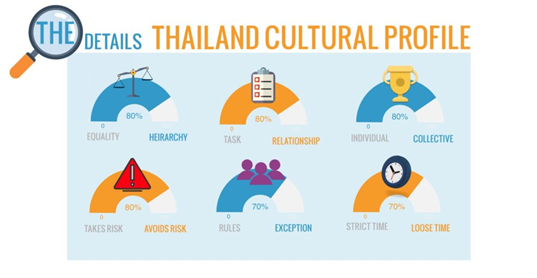As anyone who has completed an international assignment will tell you, each country has cultural differences and norms that can make expatriate life challenging. In this continuing series spotlighting country cultural differences, we will examine some of the aspects of culture in Thailand, a common location for international assignments. Below, our long-time trusted partner, IOR Global Services, provides important information for successful cultural integration.
Quick Facts
- Group Orientation and Cooperation: With Buddhism being central to Thai culture, group harmony tends to be strongly valued. Smiling may be used to help ensure harmony. Conflicts are generally avoided. Too much competitiveness may be perceived as disruptive. Group welfare tends to supersede individual concerns. Nevertheless, people do tend to have a strong sense of self.
- Hierarchy and Equality: Thai culture tends to be quite hierarchical, with clear patterns of rank and authority. Social stratification is evident in various ways of saying “I” and “you,” depending on the speaker’s status. Thai employees will generally acknowledge the superiority of their manager and refrain from contradiction. Thai managers typically have control over decision-making while subordinates will usually defer.
Despite the hierarchy, Thailand is one of the most welcoming countries to transgender people, and greater equality is being achieved for the LGBTQ community. While Thailand is largely ethically and religiously homogenous, with more than 90% reporting as Thai and Buddhist, there are smaller minority ethnic and religious groups, including “hill tribes” and Malay Muslims. Many large businesses are also owned by ethnic Chinese Thai citizens.
- Rule Following (Particularism) and Time: Context plays as much of a role as formal rules and guidelines. There is usually accommodation to circumstances, fate, and previously established relationships. Thais tend to see time as plentiful and elastic. Set times are more closely adhered to in business. The Thai phrase “ngan and sanuk” (meaning “work and play”) implies that the workplace often can be an environment for working and for enjoying life.
Fun Facts
- 15% of Thailand’s GDP is based on tourism. Exports of textiles and electronics are other top contributors to GDP.
- Thais are extremely proud that their country, a constitutional monarchy, was never colonized.
- More than 93% of Thais are Buddhist, making it one of the world’s largest Buddhist populations.
- Thailand is known as “the Land of Smiles,” which are used to express a variety of emotions from happy to sad to angry.
Communication in Thailand
Emotionally Restrained: Messages may appear to wander with the meaning being implied. Many Thais will avoid using the word “no.” Rejection may be expressed indirectly, such as by saying, “that is difficult.” Too much candor or honesty may be considered embarrassing and counterproductive. Nonverbal cues, such as facial expressions, body movements, gestures, pauses, and smiles are generally an intrinsic part of the message.
Thai people tend to avoid emotional displays, placing a higher importance on patience, humor, and “jai yen” (“cool heart”). Refraining from too much emotional expression is rooted in Buddhist teachings about detachment of the self from one’s emotions and the belief that emotional restraint preserves harmony. Overt displays of emotion may be seen as immature and can erode trust.
Formal: Thais use the “wai,” a traditional Thai greeting which consists of a slight bow with palms pressed together in prayer-like fashion. The higher the hands are held and the lower the bow, the more respect is being shown. The wai is traditionally observed upon formally entering or leaving someone’s home. “Waing” is an extremely important part of social behavior among Thais, who tend to be sensitive to their relative standing in the context of hierarchical Thai society. One should always return a wai that is offered as a sign of respect. However, visitors to Thailand should not wai someone younger than themselves first.
In Thai, the word “Khun” – the equivalent of Mr., Mrs., or Miss in English – is often used as a term of respect for nearly anyone. “Khun” precedes a Thai name to show respect for the person.

*image courtesy of IOR
Want to learn more about an assignee’s day-to-day life in Thailand (or any other country)? Please contact your Aires representative.


